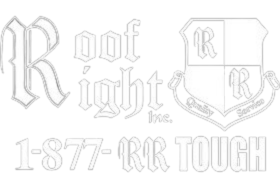Signs You're Falling for a Roofing Scam
Unfortunately, every year there are many homeowners who fall victim to the various roofing scams. A lot of these fraudulent companies or individuals prey on people’s fears that their homes are in danger or that other options are far too expensive. These unethical roofers are sometimes hard to spot, but there are signs you’re falling for a roofing scam. At Roof Right Inc, a family-owned roofing company in Carroll County, we have put together a comprehensive list of signs you are falling for a roofing scam and what to really look for instead.
Signs You’re Falling for a Roofing Scam
Storm Chasers
Worried homeowners can be easy prey for fraudsters after an intense storm. Some roofers nicknamed “storm chasers,” follow bad weather events in search of damaged roofs. They will often go door to door, handing out leaflets and offering to repair or replace roofs that appear damaged. Sometimes there isn’t any damage at all.
The strategy is convincing homeowners that they can get a new roof for a huge discount by filing an insurance claim after a big storm.
The roofer will get paid, the homeowner does get a new roof and the insurance company pays for it all. On paper it looks like a win-win but you do not want to file an erroneous claim if there’s no damage. Obviously, insurance companies will inspect the roof and only pay if it has hail or wind damage that rises to the level that warrants a roof replacement.
The work done by this individual is often very poor. The key for the roofer is to replace as many roofs as possible for as little cost as possible and then get out of town. The lifespan of a roof replaced this way is often half that of a well-constructed roof.
Another tactic is that the roofer will mention finishing a job nearby and has extra material. With that, he will offer a special discount. This is a classic roofing scam. Don’t fall for it.
Low Starting Bid
Some contractors will offer you an extremely low estimate, one that is far lower than any competitor you’ve talked with. Once the work starts, though, the price could creep up due to “unforeseen problems” and inflated material costs.
The costs of materials, of course, fluctuate, but a contractor shouldn’t attempt to increase the price for materials in the middle of your project.
Mystery Damage
Your roof appears to be in fine shape, even after a big storm. One day, though, a roofer knocks at the door claiming to see damage on the roof.
He will point out some vague damage that is hard to see but insists it is a red flag. He might even go up to the roof and claim it to be a mess that needs attention right away.
Some roofers claim there is damage to a roof when there clearly isn’t any. Others have even been caught causing damage themselves on purpose.
Insurance Fraud Scam
There are a few types of insurance fraud that a contractor may attempt to commit. One of these is submitting two separate invoices, a lower one to the homeowner, and a much higher one to the insurance company.
This is fraud, and it could be prosecuted, which means trouble for you. Sometimes, a contractor will even claim that they’ll get enough money back from over-billing your insurance company to pay back your deductible.
High-Pressure Sales
One of the most common roofing frauds involves a contractor who will show up to a consultation or presentation offering a “today only” deal in order to put pressure on the homeowner into signing a legally binding contract on the spot without conducting additional research.
Cheap Materials
Some contractors will inflate their profit margins by charging a lot to perform repairs using such poor materials that the work will need to be done again. In many cases, cosmetically things appear ok, but in reality, they are just covering up a worsening problem that will ultimately cost the homeowner a lot more money to fix down the road.
Large Down Payment
A clear sign of a scam is a contractor who is asking for a large down payment before beginning any work. These con artists will take your money and run, never to be heard from again.
It is reasonable for a contractor to ask for a modest down payment to cover the cost of materials. However, this shouldn’t exceed 20 percent of the projected total bill. If you receive an estimate with a 50 percent or higher down payment, that is a big red flag not work with that company or individual.
How to Avoid Roofing Scams
In order to avoid falling for roofing scams the most important thing you can do is not rush into anything. Roofing scams prey on homeowners anxiety. If you take your time, ask to see proof of license and insurance, and follow up with references you will avoid many of these roofing scams.
By doing some research on the company itself and some of its competitors you will be able to see the bigger picture when it comes to roofing. Remember a reputable roofing company will never hide information or evade questions about costs or materials.
